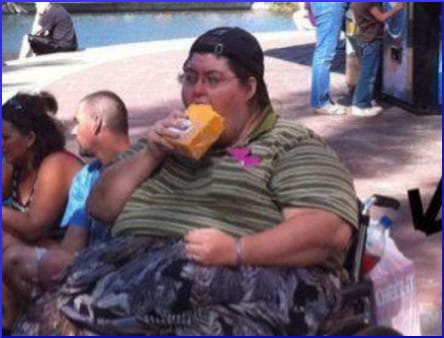When obesity is the topic, cheese is destined to be a star. In Dr. Pretlow’s very useful booklet, “Addiction Model Intervention for Obesity in Young People” it holds a prominent place on the list of problem foods (see page 33).
Since last discussing cheese, we have collected a few items of cheese trivia. According to Amy Terlisner, NMD, cheese contains the mycotoxin citrinin, a poisonous spore-based life form that may reduce testosterone production and contribute to kidney disease. In her book Life is Hard, Linda Spangle named cheese as one of the specific food types that appeal to a person who is trying to alleviate sadness, rather than some other kind of stress. Many nutrition professionals recommend niacin supplements to counteract cheese cravings.
By the way, depending on its type, cheese just might contain gluten. It is also purported to contain BCM7, which is suspected of affecting the human body like an opiate, is potentially addictive and definitely hinders weight loss.
Anti-cheese activists have a way of describing the stuff that can cause a listener to avoid it for days, if not weeks. The same illustration might look enticing or disgusting, either or both—like one titled “Close-up of Nathan’s Chili Cheese Fries.” The photo might also have been taken at the autopsy of a very obese person. The only indication that it was not is the section of decorated ceramic plate.
How do the corporations and the government conspire to (their words) “trigger the cheese craving?” Why does the U.S. Department of Agriculture maintain a huge agency (with a staff of 160 or so) whose one job is to help fast food companies cram the maximum amount of cheese down the throats of Americans? The Dairy Council named cheese the nation’s #1 snack food. Why is it the prevalent ingredient in almost every fast food genre?
“Substance-Use Disorder in DSM-5” aims to help understand the categories and terminology of the Diagnostic and Statistical Manual. In this fanciful little drama, as the exemplar of an abused substance, cheese is the star. Another previous Childhood Obesity News post contains quotations from young visitors to Dr. Pretlow’s Weigh2Rock website, where many similar messages can be found. In his book, Overweight: What Kids Say, the most relevant and expressive messages have been curated, which provides a certain advantage.
The same post also recalls words from Jen Kirkman. Indeed, cheese seems to hold a special place in the hearts of comedians. “See what I did there?” as the cheesy ones are fond of saying. Here are two more quotations from contemporary stand-up comedy artists:
There’s almost no reason to ever eat cheese. It gives you nothing. It’s all only bad.
—Ari ShaffirI think I’d give up sex before cheese.
—Candice Thompson
… which segues smoothly into the astonishing news that some people will quit chocolate sooner than renouncing cheese. That is a significant red flag, or ought to be.
Your responses and feedback are welcome!
Source: “Against the Grain: Mycotoxins in Our Food,” TownsendLetter.com, October 2012
Image by collegehumor.com


 FAQs and Media Requests:
FAQs and Media Requests: 











